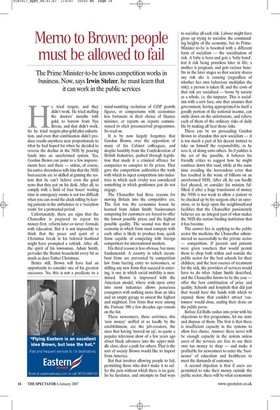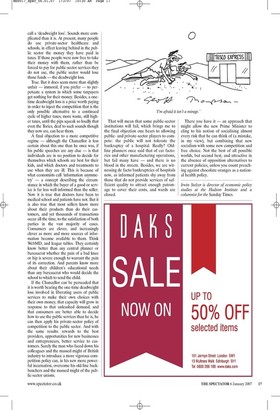Memo to Brown: people must be allowed to fail
The Prime Minister-to-be knows competition works in business. Now, says Irwin Stelzer, he must learn that it can work in the public services He tried targets, and they didn't work. He tried stuffing the doctors' mouths with gold, to borrow from Nye Bevan, and that didn't work. So he tried targets-plus-gold-plus-exhortation, and even that combination didn't produce results anywhere near proportionate to what he had hoped for when he decided to reverse the decline in the NHS by pouring funds into an unreformed system. Yes, Gordon Brown can point to a few improvements here and there — unless, of course, his native shrewdness tells him that the NHS bureaucrats are so skilled at gaming the system that he can't believe even the good news that they put on his desk. After all, to comply with a limit of four hours' waiting time in emergency rooms is not too difficult when you can avoid the clock tolling by leaving patients in the ambulance or a 'reception room' for a protracted period.
Unfortunately, there are signs that the Chancellor is prepared to repeat his money-first, reform-later-or-never formula with education. But it is not impossible to think that the peace and quiet of a Christmas break in his beloved Scotland might have prompted a rethink. After all, the spirit of his townsman, Adam Smith, pervades the Brown household every bit as much as does Father Christmas.
Better still, Brown will have had an opportunity to consider one of his greatest successes. No, this is not a predicate to a mind-numbing recitation of GDP growth figures, or comparisons with economies less fortunate in their choice of finance minister, or reports on reports commissioned to elicit preconceived programmes. So read on.
It is by now largely forgotten that Gordon Brown, over the opposition of many of his Cabinet colleagues, and despite hostility from the Confederation of British Industries, pushed through legislation that made it a criminal offence for companies to conspire to fa prices. That gave the competition authorities the tools with which to inject competition into industries in which such rivalry was considered something in which gentlemen just do not engage.
The Chancellor had three reasons for moving Britain into the competitive era. The first was the economics lesson he learned from Adam Smith: businessmen competing for customers are forced to offer the lowest possible prices and the highest possible quality. The second was that an economy in which firms must compete with each other is likely to produce lean, quick firms capable of competing with foreign competitors for international markets.
His third reason is less obvious, but more fundamental. A country in which incumbent firms are prevented by competition law from barring entry to newcomers, or stifling any new firms that succeed in entering, is one in which social mobility is maximised. Brown is impressed with the American model, where wide-open entry into most industries allows penurious youngsters with nothing more than an idea and an empty garage to unseat the highest and mightiest. Few firms that were among the Fortune 500 a few decades ago remain on the list.
These newcomers, these arrivistes, this 'new money' sniffed at so loudly by the establishment, are the job-creators, the ones that having 'moved on up', to quote a popular television show of a few years ago about black advances into the upper-middle class, clear a path for others. That is the sort of society Brown would like to import from America.
But that involves allowing people to fail, permitting those who don't make it to suffer the pain without which there is no gain. So he hesitates, and attempts to find ways to socialise all such risk. Labour might have given up trying to socialise the commanding heights of the economy, but its PrimeMinister-to-be is besotted with a different form of socialism — the socialisation of risk. A baby is born and gets a 'baby bond', lest it risk being penniless later in life; a mother is pregnant, and gets various benefits in the later stages so that society shares any risk she is running (regardless of whether her own behaviour multiplies the risk); a person is taken ill, and the costs of that risk are socialised — borne by society as a whole, i.e. the taxpayer. This is socialism with a new face, one that assumes that government, having appropriated to itself a goodly portion of the national income, can smile down on the unfortunate, and relieve each of them of the ordinary risks of daily life by making all bear those risks.
There can be no persuading Gordon Brown to abandon this new socialism — it is too much a part of his decent instinct to take on himself the responsibility, as he sees it, of doing unto others. So if politics is the art of the possible, it behoves his friendly critics to suggest how he might continue down this road, while at the same time avoiding the horrendous error that has resulted in the waste of billions on an unreformed NHS. After all, he can hardly feel pleased, or consider his mission fulfilled, if after a huge transfusion of money the NHS is too weak to allow a patient to be checked up by his surgeon after an operation, or to keep open the neighbourhood facilities that the Chancellor passionately believes are an integral part of what makes the NHS the nation-binding institution that it has become.
The answer lies in applying to the public sector the medicine the Chancellor administered so successfully to the private sector — competition. If parents and patients were given vouchers that would permit them to shop both within and outside the public sector for the best schools for their children, and the best courses of treatment for the sick, the providers of services would have to do what Adam Smith described, and the Chancellor knows to be the case — offer the best combination of price and quality. Schools and hospitals that did just that would have the funds with which to expand; those that couldn't attract 'customers' would close, ending their drain on the public purse.
Before Ed Balls rushes into print with his objections to this programme, let me state and dispose of them. The first is that there is insufficient capacity in the systems to allow free choice. Answer: there never will be enough capacity in the system unless users of the services are free to use their own tax money to shop — and make it profitable for newcomers to enter the 'businesses' of education and healthcare to meet the demands of customers.
A second objection is that if users are permitted to take their money outside the public sector, there will be what economists call a 'deadweight loss'. Sounds more complicated than it is. At present, many people do use private-sector healthcare and schools, in effect leaving behind in the public sector the money they have paid in taxes. If those people were now free to take their money with them, rather than be forced to pay for public-sector services they do not use, the public sector would lose those funds — the deadweight loss.
True. But it does seem more than slightly unfair — immoral, if you prefer — to perpetuate a system in which some taxpayers get nothing for their money. Besides, a onetime deadweight loss is a price worth paying in order to inject the competition that is the only possible alternative to a continued cycle of higher taxes, more waste, still higher taxes, until the pips squeak so loudly that even the Tories, deaf to such sounds though they now are, can hear them.
A final objection to a more competitive regime — although the Chancellor is less certain about this one than he once was, if his public speeches are any clue — is that individuals are in no position to decide for themselves which schools are best for their kids, and which doctors and treatments to use when they are ill. This is because of what economists call 'information asymmetry' — a concept describing the circumstance in which the buyer of a good or service is far less well-informed than the seller. Now it is true that doctors have been to medical school and patients have not. But it is also true that most sellers know more about their products than do their customers, and yet thousands of transactions occur all the time, to the satisfaction of both parties in the vast majority of cases. Consumers are clever, and increasingly clever as more and more sources of information become available to them Think WebMD, and league tables. They certainly know better than any central planner or bureaucrat whether the pain of a bad knee or hip is severe enough to warrant the pain of its correction. And parents know more about their children's educational needs than any bureaucrat who would decide the school to which to send the child.
If the Chancellor can be persuaded that it is worth bearing the one-time deadweight loss involved in liberating users of public services to make their own choices with their own money, that capacity will grow in response to that unleashed demand, and that consumers are better able to decide how to use the public services than he is, he can then apply his private-sector policy of competition to the public sector. And with the same results: rewards to the best providers, opportunities for new businesses and entrepreneurs, better service to customers. Surely the man who faced down his colleagues and the massed might of British industry to introduce a more vigorous competition policy can, in his new more powerful incarnation, overcome his old-line backbenchers and the massed might of the public-sector unions.
That will mean that some public-sector institutions will fail, which brings me to the final objection one hears to allowing publicand private-sector players to compete: the public will not tolerate the bankruptcy of a hospital. Really? Oldline planners once said that of car factories and other manufacturing operations, but fail many have — and there is no blood in the streets. Besides, we are witnessing de facto bankruptcies of hospitals now, as informed patients shy away from those that do not provide services of sufficient quality to attract enough patronage to cover their costs, and wards are closed.
There you have it — an approach that might allow the new Prime Minister to cling to his notion of socialising almost every risk that he can think of (a mistake, in my view), but combining that new socialism with some new competition and free choice. Not the best of all possible worlds, but second best, and attractive in the absence of opposition alternatives to current policies, unless you count preaching against chocolate oranges as a national health policy.
Irwin Stelzer is director of economic policy studies at the Hudson Institute and a columnist for the Sunday Times.





































 Previous page
Previous page